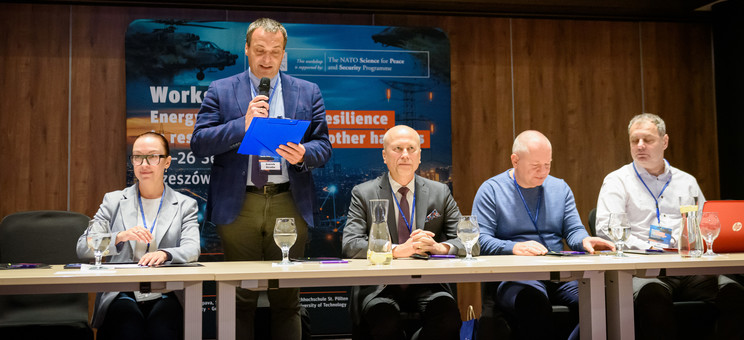The workshop “Energy infrastructure resilience in response to war and other hazards” was organized by employees of the Complex Systems Department at the Faculty of Electrical Engineering and Computer Science of the Rzeszów University of Technology and Igor Sikorsky from the Kyiv Polytechnic Institute, Ukraine. The workshop was financed from grant no. G7205 obtained by the Rzeszów University of Technology as part of the “Science for Peace and Security Programme” competition organized by NATO for events included in the Advanced Research Workshop (ARW).
The purpose of the event
The aim of the event was to strengthen the ability of energy experts to respond quickly to potential disruptions to civilian energy infrastructure during military aggression. Using the Virtual Reality Laboratory, unique software and simulated scenarios, practical classes and a series of presentations were conducted to prepare for a quick response to threats and support the process of maintaining the infrastructure. The main goal of the workshops was to equip professionals with advanced skills to counter potential infrastructure outages, while ensuring the resilience of energy infrastructure to mass disruptions, including cyberattacks.
Participants
The event was attended by experts from countries that have experienced attacks on critical infrastructure during various conflicts: Latvia, Germany, Georgia, Ukraine, the Czech Republic, Austria, Poland. Invited speakers shared knowledge that is applicable to the development of energy strategies in other countries, facilitating the implementation of best practices in the field of energy security.
The main reason for organizing the event was the need to communicate and exchange practical experiences related to the broadly understood various security and cybersecurity problems in the context of NATO’s strategic goals. Using various IT tools and solutions, it was possible to simulate, early indicate and predict various consequences of attacks and threats that have a major impact primarily on the civilian population. Since in today’s highly developed society, special attention is paid to selected elements of critical infrastructure, it was emphasized during the workshops that in most cases critical infrastructure is strongly dependent on uninterrupted energy supplies. Energy security is therefore becoming a very important challenge.

